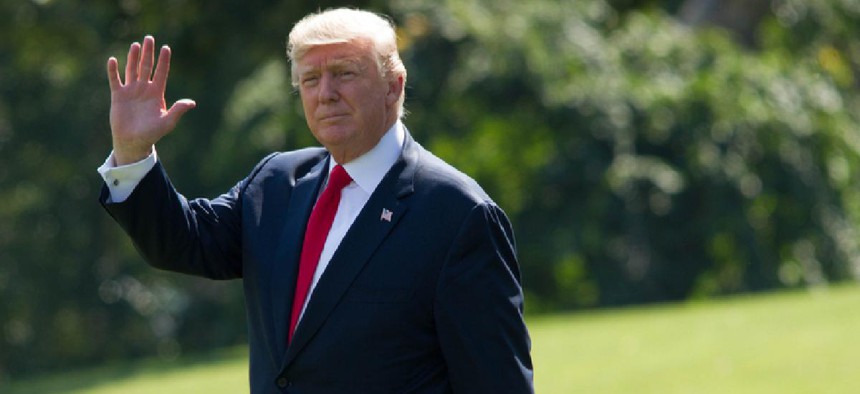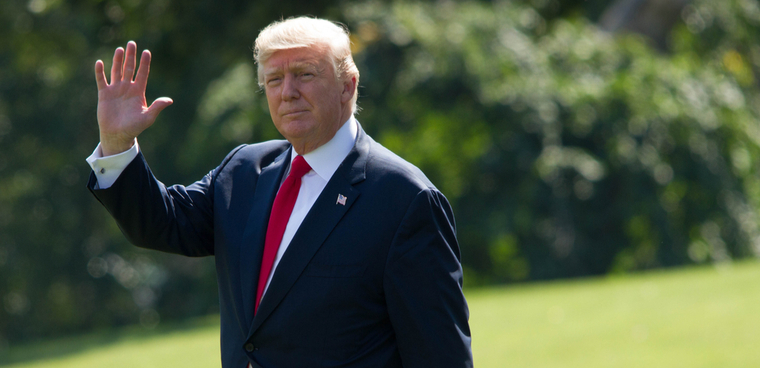Shutdown ends with three-week stopgap deal

President Trump announced a deal with Congress to fund the government while negotiations for border security priorities take place.

The government shutdown is over – for now.
On day 35 of a partial government shutdown that saw 800,000 federal employees furloughed or working without pay, President Donald Trump announced a deal with lawmakers to extend appropriations for three weeks while a deal is worked out on the administration's border security priorities.
The deal gives lawmakers and the White House until Feb. 15 to fund the government beyond that date.
Federal employees won't have to wait for the next scheduled pay date to get their back pay. Under the terms of the Government Employee Fair Treatment Act of 2019, feds will be paid "at the earliest date possible."
The deal still has to be voted on in the House and the Senate and signed by the president. In a statement, Senate Majority Leader Mitch McConnell said the Senate could pass a bill on Friday. If the House and the president follow suit, the government could reopen Friday, with most employees due to report on Monday Jan. 28.
"I want to thank all of the incredible federal workers and their amazing families who have shown such extraordinary devotion in the face of this recent hardship. You are fantastic people. You are incredible patriots. Many of you have suffered far greater than anyone but your families would know or understand. And not only did you not complain, but in many cases you encouraged me to keep going because you care so much about our country and about its border security," Trump said in a statement announcing the deal.
The stopgap deal came about after two bills to reopen the government, one with border wall funding backed by the administration and one a short term continuing resolution, failed to advance in the Senate. Federal employees working without pay and those on furlough missed a second paycheck on Friday, Jan. 25.
In the hours before the deal was made public, air traffic controllers announced significant delays to three major east coast airports as a result of staffing shortages as a result of the shutdown.
The shutdown "has already pushed hundreds of thousands of Americans to the breaking point. Now it's pushing our airspace to the breaking point too," House Speaker Nancy Pelosi tweeted on Jan. 25.
The shutdown impacts employees and programs at the departments of Homeland Security, Agriculture, State, Treasury, Commerce, Justice, Transportation, Housing and Urban Development and the Environmental Protection Agency as well as NASA, General Services Administration, the Office of Management and Budget and the White House itself.
More than a million government contractors were also idled as a result of the shutdown. A few members of Congress offered bills to provide back pay for those – including one focused on hourly workers doing retail, food service and janitorial work.
"While reopening the government is long overdue, I will not celebrate a temporary reprieve to a politically motivated crisis that has left many federal employees in anguish over how to pay their bills, feed their families, and keep a roof over their heads," said J. David Cox, national president of the American Federation of Government Employees. "Over the next three weeks, Congress must pass full-year appropriations for all government agencies as well legislation to make all affected federal employees whole. We are also urging Congress to act to prevent the use of shutdowns from ever occurring again," he said.
The punt to Feb. 15 leaves three weeks for lawmakers and the White House to come up with a border security plan.
"If we don't get a fair deal from Congress, the government will either shut down on February 15 again or I will use the powers afforded to me under the laws in the Constitution of the United States to address this emergency," Trump said in his Jan. 25 announcement.
As part of the deal Trump announced, a bipartisan committee of lawmakers and government leaders will review recommendations of security experts and law enforcement.
Rep. Bennie Thompson (D-Miss.), chairman of the House Homeland Security Committee, said, "Democrats remain committed to effective border security but will only allow taxpayer money be spent on border security measures that will actually make a difference."
Pelosi welcomed the reopening of government but declined to speculate on what will happen when the continuing resolution expires. "I can't assure the public on anything the president will do," she said.
This article was updated Jan. 25 with additional information.
NEXT STORY: Legislators look for new ways to pay feds



